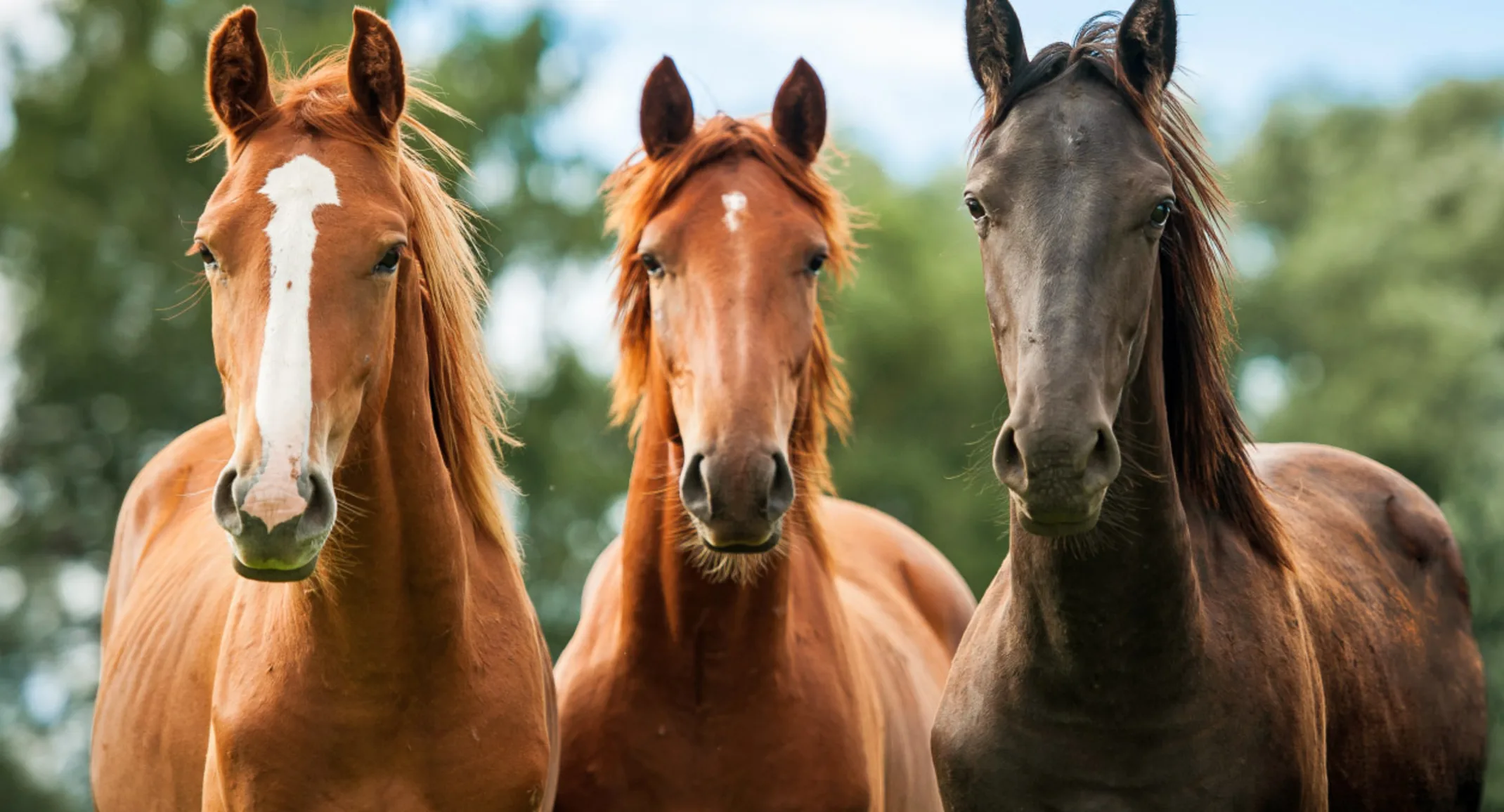Immunizations
General

Immunizations: Protect Your Horse Against Infectious Diseases
Brought to you by: Bayer Healthcare, an AAEP Educational Partner
Few things will protect your horse from the ravages of disease as easily and effectively as immunizations. The vaccines administered by your veterinarian to your horse place a protective barrier between the animal and a whole list of problems: tetanus, encephalomyelitis (sleeping sickness), influenza, rhinopneumonitis, rabies, strangles, West Nile virus and Potomac Horse Fever, to name the most common.
What to Expect
A good immunization program is essential to responsible horse ownership, but just as in humans, vaccination does not guarantee 100% protection. In some situations, immunization may decrease the severity of disease but not prevent it completely. This is due to many complicated scientific reasons, such as differences in the virulence or severity of some diseases (such as influenza).
Vaccination involves the injection (with a sterile syringe and needle) of bacteria or viruses that are inactivated or modified to avoid causing actual disease in the horse. Recently, intranasal vaccinations have been developed for immunization against influenza and strangles. Two or more doses are usually needed to initiate an adequate immune response. Once the immunization procedure is completed, the protective antibodies in the blood stand guard against the invasion of specific disease causing organisms. Over time, however, these antibodies gradually decline. Therefore, a second vaccination is required to boost immunity to acceptable levels. Protection against some disease causing organisms such as tetanus and rabies can be accomplished by boostering once a year. Others require more frequent intervals to provide adequate protection.
Vaccinations Needed
The specific immunizations needed by a particular horse or horses depend upon several factors: environment, age, use, exposure risk, geographic location and general management. Your local equine veterinary practitioner can help you determine the vaccination program best suited to your horse’s individual needs.
The following diseases are those most often vaccinated against. Again, your local veterinarian will know what is best for your horse.
Tetanus: Sometimes called “lockjaw,” tetanus is caused by toxin-producing bacteria present in the intestinal tract of many animals and found in abundance in the soil where horses live. Its spores can exist for years. The spores enter the body through wounds, lacerations or the umbilicus of newborn foals. Therefore, although not contagious from horse to horse, tetanus poses a constant threat to horses and humans alike. Symptoms include muscle stiffness and rigidity, flared nostrils, hypersensitivity, prolapsed third eyelid and the legs stiffly held in a sawhorse stance. As the disease progresses, muscles in the jaw and face stiffen, preventing the animal from eating or drinking. More than 80% of affected horses die.
All horses should be immunized annually against tetanus. Additional boosters for mares and foals may be recommended by your veterinarian. Available vaccines are inexpensive, safe and provide good protection.
Encephalomyelitis: More commonly known as “sleeping sickness,” this disease is caused by the Western Equine Encephalomyelitis (WEE) virus or the Eastern version (EEE). WEE has been noted throughout North America, while EEE appears only in the East and Southeast. VEE, the Venezuelan variety, has not been seen in the United States for many years (however, a recent outbreak of VEE occurred in Mexico). Sleeping sickness is most often transmitted by mosquitoes after the insects have acquired the virus from birds and rodents. Humans also are susceptible when bitten by an infected mosquito, but direct horse-to-horse or horse-to-human transmission is very rare.
Symptoms vary widely, but all result from the inflammation of the brain. Early signs include fever, depression and appetite loss. Later, a horse might stagger when it walks, and paralysis develops in later stages. About 20%–50% of horses infected with WEE die, and the death rate is 75%–100% of animals infected with EEE. The mortality rate for VEE is 40%–80%.
All horses need an EEE and WEE vaccine at least annually. Pregnant mares and foals may require additional vaccinations. The best time to vaccinate is one month before mosquitoes become active. In the South and West, it may be recommended that your horse be vaccinated more often than annually. Be sure to consult your veterinarian for the recommendations in your area.
Rabies: A frightening disease, which is more common in some areas than others. Horses are infected infrequently, but death always occurs. Rabies can be transmitted from horses to humans.
West Nile virus (WNV): A neurological disease that affects horses throughout the continental United States and is transmitted through the bite of an infected mosquito. States with more persistent mosquito populations may require more aggressive vaccinations along with aggressive mosquito control techniques. Follow your veterinarian’s recommendations. Other Disease Threats Several other diseases are common, although the need for vaccination against them is a highly individual one. Rely on your veterinarian to guide you.
Other diseases include:
Rhinopneumonitis: Two distinct viruses, equine herpesvirus type 1 (EHV-1) and equine herpesvirus type 4 (EHV-4), cause two different diseases, both of which are known as rhinopneumonitis. Both cause respiratory tract problems, and EHV-1 may also cause abortion, foal death and neurological signs, which may eventually cause paralysis. Infected horses may be feverish and lethargic as well as lose appetite and experience nasal discharge and a cough. Young horses suffer most from respiratory tract infections and may develop pneumonia secondary to EHV-1.
Rhinopneumonitis is spread by aerosol and by direct contact with secretions, utensils or drinking water. The virus may be present but inapparent in carrier animals. All pregnant mares must be immunized. Foals, weanlings, yearlings and young horses under stress should also be vaccinated. Immune protection is short. Therefore, pregnant mares are vaccinated at a minimum during the fifth, seventh and ninth months of gestation, and youngsters at high risk need a booster at least every six months. Some horses may require more frequent vaccinations depending on disease risks.
Influenza: This is one of the most common respiratory diseases in the horse. Highly contagious, the virus can be transmitted by aerosol from horse to horse over distances as far as 30 yards (for example, by snorting or coughing).
Signs to watch for are similar to those in a human with a cold (i.e., dry cough, nasal discharge, fever, depression and loss of appetite). With proper care, most horses recover in about 10 days. Some, however, may show symptoms for weeks, especially if put back to work too soon. Influenza is not only expensive to treat, but results in a lot of “down time” and indirect financial loss, not to mention discomfort to your horse.
Unfortunately, influenza viruses constantly change in an effort to bypass the horse’s immune defense. Therefore, duration of protection is short-lived and revaccination is recommended every six months. Some horses may require more frequent vaccinations depending on disease risks.
Not all horses need influenza vaccinations. However, animals that travel or are exposed to other horses should be regularly immunized against influenza. Follow your veterinarian’s advice as to whether your horse needs an influenza vaccine.
Strangles: A highly contagious and rarely fatal disease. There may be some side effects associated with vaccination; therefore, it is important to discuss the risks versus benefits of vaccination with your veterinarian.
Botulism: Known as “shaker foal syndrome” in young horses, this disease can be serious. Botulism in adult horses, “forage poisoning,” can also be fatal. Vaccines are not available for all types of botulism, but pregnant mares can be vaccinated in endemic areas.
Equine viral arteritis (EVA): A complicated disease that can result in some breeding restrictions and export problems. Follow your veterinarian’s recommendations.
Potomac Horse Fever: A seasonal problem with geographic factors. The mortality rate varies from 5%-30%. Contact your veterinarian.
Many combination vaccinations are available. Please check with your local equine practitioner. Appropriate vaccinations are the best and most cost-effective weapon you have against common infectious diseases of the horse. A program designed with the help and advice of your local veterinarian will keep your horses –and you-happy and healthy for many years to come.
